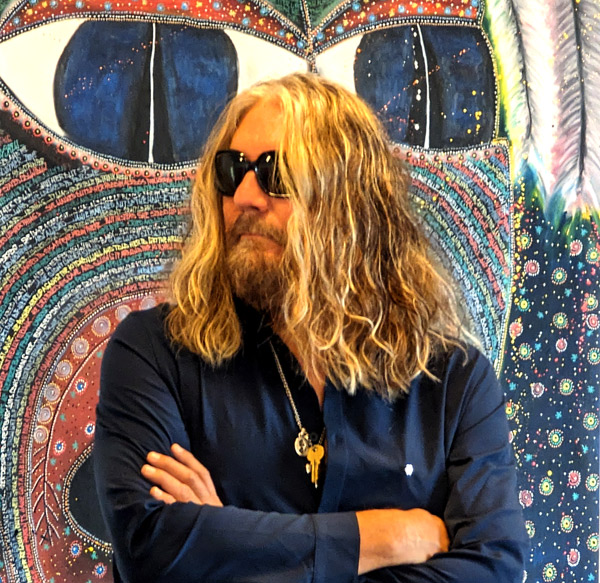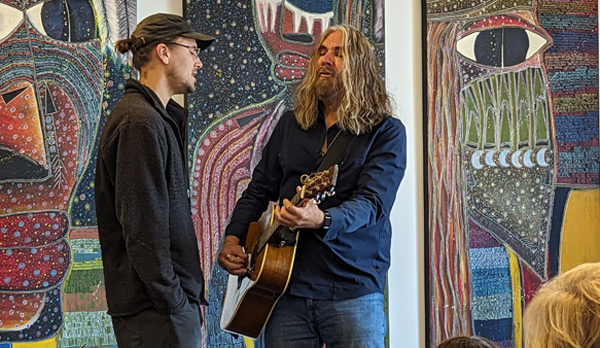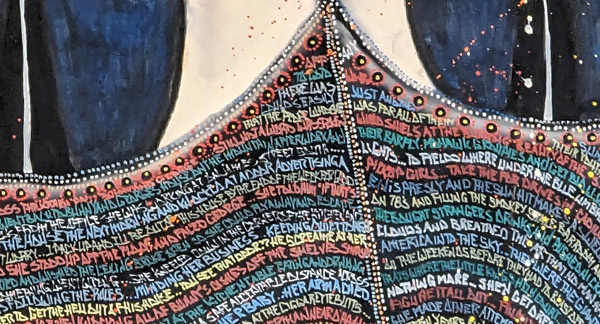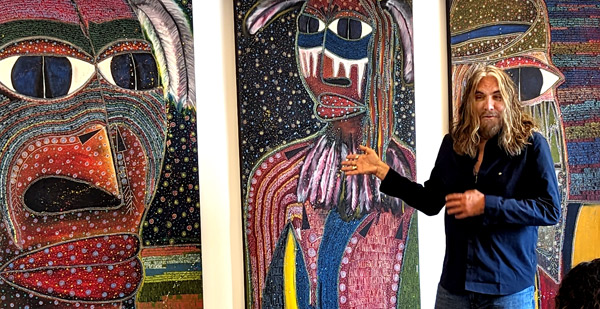At age 53, a big, puffy, sweaty Irishman learned he was actually Mohawk
Sue Capon | Sep 29, 2023 | Comments 1

When artist, author and musician Tom Wilson unveiled his triple-panel Warrior paintings at the Picton Branch Library this week, he shared his story of realization that about 10 years ago, at age 53, he learned he is Mohawk, and not a “big, puffy, sweaty Irishman.”
His paintings were hung in the new area of the Picton Branch Library, on loan from the County’s Singh/Kilduff family to start conversation ahead of National Day for Truth and Reconciliation Sept. 30.
Emcee Dave Hatch, owner of Hatch Gallery in Bloomfield where Wilson’s art is being shown, reminded the group the impetus of the National Day for Truth and Reconciliation is the honouring of children who never returned home, and the survivors of residential schools, their families and communities.
“Some of us stood outside this library and there was a statue out there of this country’s first prime minister covered in paint and surrounded by shoes… and here we are these few years later unveiling a very important piece of Mohawk art in this space.”
Wilson greeted nearly 50 people attending to witness the unveiling.
“We’ve been given a great gift in this country. That is the gift of opportunity to start a conversation – and responsibilities to keep the conversation going.
“I don’t try to tell anyone else’s story but my own and in my paintings, and in these three paintings that we have here, get closer and you’ll be able to see that I’ve taken my original words, stories from my books, etc and painted them into these works… the stream of consciousness would take over and all of a sudden what I was writing into the paintings was more vibrant, more alive and more poetic than what I sat down and wrote at my computer.”
Wilson has been painting since 1997 “the second time I tried to stop drinking” and though unsuccessful in that attempt, he is looking forward to celebrating 24 years sober in December.
“So when I wanted to do something productive rather than destructive, I started taking canvases and started putting these images on them and I did that for years… then people started buying my paintings and that was pretty exciting because I never imagined I could get any money for this work, and I continued painting.
“And my daughter came to me, probably 20 years ago now and she said, ‘Dad, you have to stop painting like this. This is cultural appropriation. Me being a knucklehead from Hamilton said ‘I don’t even know what that means.’ She said ‘It’s when you take someone’s culture and use it for your own advantage.'”
Wilson explained he was just painting what was “coming out. Images that made sense to him and that he was able to detail with his words.
He shared his words from his novel published in 2017 titled Beautiful Scars which addresses the discovery of his Mohawk heritage.
About a decade ago, at age 53, he learned from a stranger who knew his family that he was adopted – and that his cousin, Janie, 18 years his senior, was actually his mother. She asked his forgiveness and revealed she and his birth father were Mohawk, from Kahnawake First Nation, outside of Montreal.
His Mohawk name is Tehoh’ahake, which means ‘Two Roads’.
The loving parents who raised him – Bunny and George – had him thinking “all my life I was a big, puffy, sweaty Irishman and here I am, a Mohawk”.
Since, he has put Mohawk culture and Indigenous issues into the light through his music, and his book, which was made into a documentary film by the same name, and coming soon, a stage play and a coffee table book of his art.

Wilson is also well known as a performer in the roots rock trio Blackie and the Rodeo Kings and in Lee Harvey Osmond, with members of Cowboy Junkies and Skydiggers – and his son Thompson who joined him in performance at the library.
“All these things I am doing, I’m leading with art. (Metis leader) Louis Riel said that our world, our culture, our people will come into the light and be in the forefront – through art -not through angry words, not through blackened hearts,” said Wilson. “Pretty smart as the way that we’re going to move forward not only as a community or as a country, or as a civilization is not through Twitter.”
He stressed the stories must continue to be told.
“The stories of the Indigenous world need to continue to be told in ways that bring people to the table; that bring you into this room; that bring you into the theatres and make you pick up books and make you see movies and go to see music representing Indigenous needs.”
Wilson called Canada the greatest country in the world but one that needs to do a lot of dusting off as it takes a good look in the mirror.
“This country needs to be part of a conversation that’s going to make us understand our history without feeling personally beaten down and guilty about it – because we don’t have to feel that way.
“We have to feel vibrant as a joined community. That’s our job.”
Wilson read from his book, explaining he was born into a racial no man’s land created by colonialism.
“The Mohawk had been wiped clean from me. I was wearing a disguise that I got handed to me when I was too young and unaware to even know that I was wearing it.”
He told how decades before his mother was sent to day residential school and at age of six and seven was asked to stand up in the classroom daily with the other Mohawk children and “take a good look around the room at one another. Take a good look because you’re seeing the last Indians that this world’s ever going to know.
“My mother believed that. She believed she was one of the last Indians on this planet. She told us this story on her 80th birthday – around the table with me, her son, my children, her grandchildren, and my two grandsons, her great grandsons. We sat celebrating four generations of Mohawks. She was not the last Indian. She was a survivor. We’re all survivors.
“Through her we stand as victims of this country’s greatest sin. Canada’s attempt to kill off the entire Indigenous population in one of the grossest, most inhumane sagas in the history of this planet that continues today with the missing and murdered Indigenous women; with the fact you can’t get clean water on the reserve and with the fact we’re still fighting for land given to us through broken treaties.”
“What is reconciliation supposed to look like in this world? Well, this is exactly the beginning of what it looks like. It looks like you and me talking to each other and eventually we will take action.
“So now it’s time to create a world where we don’t need the word reconciliation. Let us create a world where we don’t have to apologize to our grandchildren and our great grandchildren for the action that we didn’t take, for the love we didn’t spread, or the work we didn’t do.”
Wilson, a three-time Juno award winner was appointed this spring as a Companion of the Order of Canada “for his multifaceted contributions to the arts in Canada, notably as an iconic musician, as well as for his advocacy of Indigenous communities in Canada.”
Filed Under: Featured Articles
About the Author:




































Thanks for being there and sharing the story, Sue. I would encourage anyone interested to come see the art at the Picton Branch.